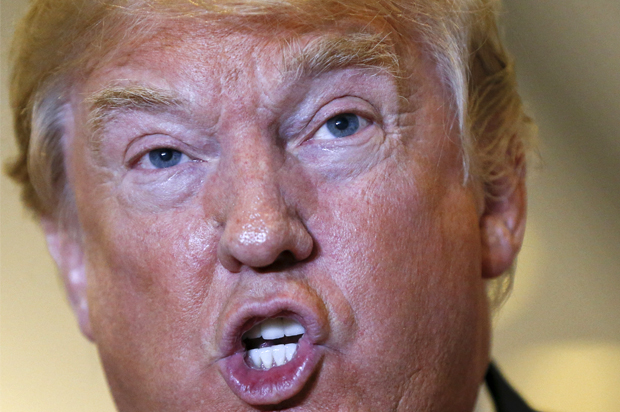Having gotten a look at the rowdy German parliament meeting from 1933 masquerading as the Republican Party’s nominating convention in Cleveland, conservatives are turning their gazes to the future. With the GOP having been transformed from a vehicle for conservative philosophy and governance into the shrieking ball of inchoate rage goaded on and led by an orange-skinned marketing strategy as empty as it has been successful, some on the right are repurposing a popular rallying cry from the faithful and turning it into their own promise to Take Our Party Back.
When you read some of the hopeful writings laying out a path back to power for the right, it seems clear that conservatives applying this particular shade of lipstick to the pig that is this election haven’t truly reckoned with how deeply Trumpism has entrenched itself in the GOP. Nor have they reckoned with how Trumpism got there in the first place or their own roles in propagating it.
Their arguments seem to be made up of either bloodless intellectualism or bankrupt cynicism divorced from the forces that have slowly come to animate the Republican Party over the last couple of decades – the appeals to nativism, the demonization of the left (particularly its most prominent politicians, who must be portrayed for voters not just as ideological opposites but criminal enemies of civilization), the bloodthirsty jingoism and militaristic patriotism. Those are forces that will not be easily dislodged by electoral defeat.
The half-empty arena in Cleveland and the prominent Republicans absent from the convention this week may have reinforced the sense of a party deeply divided between traditional conservatives and the angry populists. The evidence suggests, though, that some on the right do not yet see why the GOP has come to this pass, which might make healing a lot faster and smoother after the election.
Take this column by Steve McIntosh, founder of a right-leaning think tank called the Institute for Cultural Evolution. McIntosh recently spent a few days with right-wing luminaries like Grover Norquist and Charles Murray, which right there is evidence this confab shouldn’t be taken seriously. Here the GOP is being split apart by a presidential candidate drawing much of his support from the racist far right, and you want the input of the author of “The Bell Curve” on putting it back together?
By providing an opening for reform, Trump’s anticipated loss in November can help bring about a new version of the right that can continue to champion the power of free markets, while simultaneously welcoming immigrants, displaced workers, environmentalists, and ethnic and religious minorities.
This was a particularly egregious argument since elsewhere, McIntosh bemoans the Democratic Party’s “move toward Sanders-style socialism and its intensifying identity politics.” After all, what is Trumpism if not an extreme manifestation of white grievance against its perceived loss of status – against “political correctness” and Muslims and immigrants from south of the border who are supposedly stealing American jobs and straining America’s resources?
In short, what is Trumpism but a vulgar expression of white identity politics?
Trumpism as racial backlash by whites is curiously absent in Reihan Salam’s analysis of the Republican Party’s future as well. Or rather, it is there obliquely, framed as something driven by President Obama and the Democrats’ move to the left, which has driven more white working class voters to the Republican Party and will allow the GOP to pick off even more of them in the future. Where else are those voters going to go, Salam asks. It’s either make common cause with the minorities who make up the majority of the Democratic coalition, or come home to the party of white nativism.
In this scenario, the GOP is the passive recipient of good luck and strategic mistakes by the left, rather than the active authors of a push to capture a larger share of the white vote by pursuing a strategy of massive legislative obstruction against Obama while winking at or outright denying the racial character of much of that resistance. For instance:
Don’t forget that George W. Bush led the United States into a quagmire in Iraq that led to the deaths of thousands of Americans and hundreds of thousands of Iraqis. Bush then presided over the greatest economic calamity since the Great Depression. Those disasters didn’t prevent Republicans from doing really well in the 2010 and 2014 midterm elections.
The GOP did well in the 2010 midterms in particular because of the anger it inspired among its base over the passage of Obamacare and the perception its vast media archipelago planted among the base voters that the nation’s first African-American president wanted to help society’s “takers” by stealing from its “makers.” The makers, of course, were the GOP’s mostly white voters, who were told their taxes were going up and their precious health-care access would be reduced so that minorities could get some of it.
To ignore the role of the conservative movement in pushing this view, to act as if the GOP wave in 2010 is something that just happened, is breathtakingly cynical.
Salam admits that the GOP is going to have to “retool itself” at some point to attract non-white constituencies as its white base ages and dies off. But not addressing that fact now, pushing it off into the future at some unspecified date after the Democrats have supposedly driven more of the white working class back to the Republicans, is evidence that for all the cries of a divided party, even conservatives who have disowned Trumpism have learned exactly nothing from his takeover.

